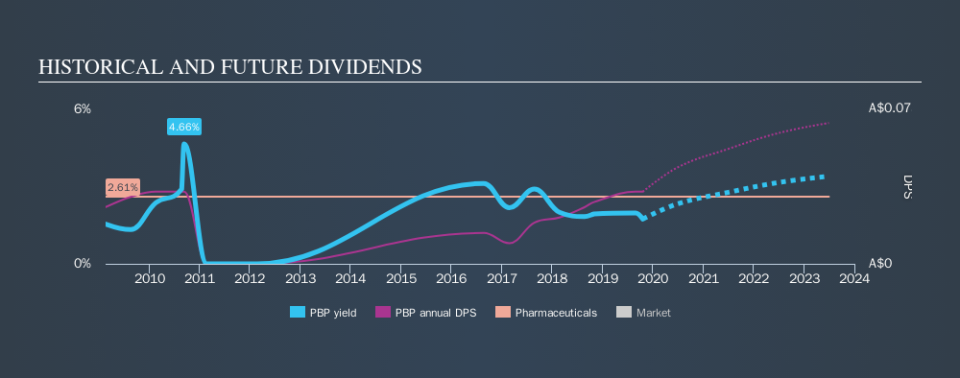Is It Smart To Buy Probiotec Limited (ASX:PBP) Before It Goes Ex-Dividend?

Readers hoping to buy Probiotec Limited (ASX:PBP) for its dividend will need to make their move shortly, as the stock is about to trade ex-dividend. You will need to purchase shares before the 24th of October to receive the dividend, which will be paid on the 31st of October.
Probiotec's next dividend payment will be AU$0.03 per share, on the back of last year when the company paid a total of AU$0.04 to shareholders. Based on the last year's worth of payments, Probiotec stock has a trailing yield of around 1.7% on the current share price of A$2.01. Dividends are a major contributor to investment returns for long term holders, but only if the dividend continues to be paid. As a result, readers should always check whether Probiotec has been able to grow its dividends, or if the dividend might be cut.
View our latest analysis for Probiotec
Dividends are typically paid from company earnings. If a company pays more in dividends than it earned in profit, then the dividend could be unsustainable. Probiotec is paying out an acceptable 53% of its profit, a common payout level among most companies. Yet cash flow is typically more important than profit for assessing dividend sustainability, so we should always check if the company generated enough cash to afford its dividend. Thankfully its dividend payments took up just 36% of the free cash flow it generated, which is a comfortable payout ratio.
It's positive to see that Probiotec's dividend is covered by both profits and cash flow, since this is generally a sign that the dividend is sustainable, and a lower payout ratio usually suggests a greater margin of safety before the dividend gets cut.
Click here to see how much of its profit Probiotec paid out over the last 12 months.
Have Earnings And Dividends Been Growing?
Stocks in companies that generate sustainable earnings growth often make the best dividend prospects, as it is easier to lift the dividend when earnings are rising. If earnings fall far enough, the company could be forced to cut its dividend. It's encouraging to see Probiotec has grown its earnings rapidly, up 30% a year for the past five years. The current payout ratio suggests a good balance between rewarding shareholders with dividends, and reinvesting in growth. Earnings per share have been growing quickly and in combination with some reinvestment and a middling payout ratio, the stock may have decent dividend prospects going forwards.
The main way most investors will assess a company's dividend prospects is by checking the historical rate of dividend growth. In the past ten years, Probiotec has increased its dividend at approximately 2.4% a year on average. It's good to see both earnings and the dividend have improved - although the former has been rising much quicker than the latter, possibly due to the company reinvesting more of its profits in growth.
Final Takeaway
From a dividend perspective, should investors buy or avoid Probiotec? Probiotec's growing earnings per share and conservative payout ratios make for a decent combination. We also like that it paid out a lower percentage of its cash flow. There's a lot to like about Probiotec, and we would prioritise taking a closer look at it.
Keen to explore more data on Probiotec's financial performance? Check out our visualisation of its historical revenue and earnings growth.
A common investment mistake is buying the first interesting stock you see. Here you can find a list of promising dividend stocks with a greater than 2% yield and an upcoming dividend.
We aim to bring you long-term focused research analysis driven by fundamental data. Note that our analysis may not factor in the latest price-sensitive company announcements or qualitative material.
If you spot an error that warrants correction, please contact the editor at editorial-team@simplywallst.com. This article by Simply Wall St is general in nature. It does not constitute a recommendation to buy or sell any stock, and does not take account of your objectives, or your financial situation. Simply Wall St has no position in the stocks mentioned. Thank you for reading.


